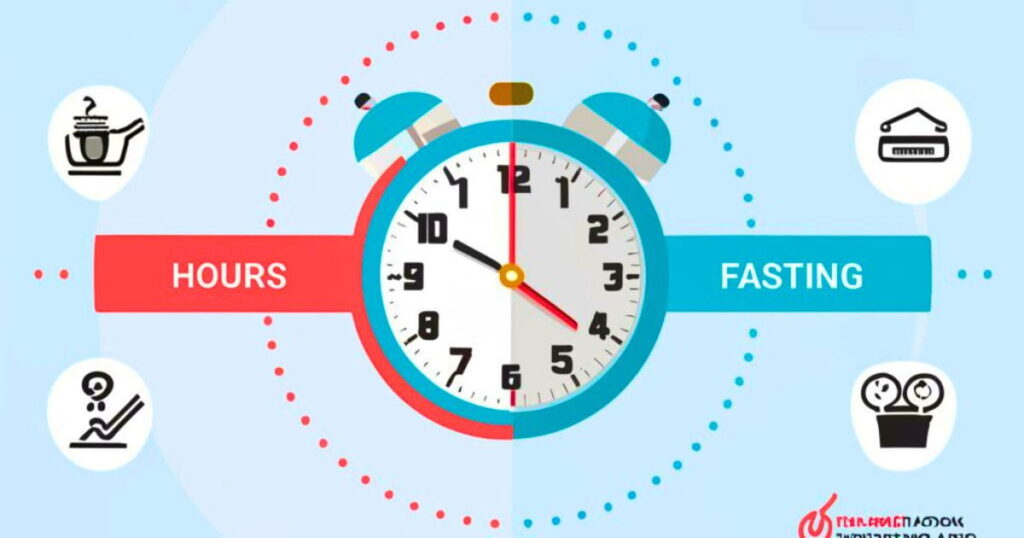For thousands of years, people have sought spiritual and religious fulfillment via fasting, which is purposefully denying oneself food for a certain amount of time.
But fasting as a diet plan for weight loss better metabolic health, and even better cognitive function has been all the rage recently.

This article will help you decide whether a fasting strategy is best for you by diving into the science underlying fasting diet programs, exploring various fasting approaches, and providing you with the information you need.
Discovering the Science Behind the Effects of Fasting on Your Body
There are many changes to your metabolism while you’re fasting. At first, the glucose that is already stored in your muscles and liver is quickly used up by your body.
When these reserves are exhausted usually within 8 to 12 hours after your previous meal your body enters a metabolic state known as ketosis when it begins to burn fat instead of carbohydrates for energy.
Many of the possible health advantages of fasting are thought to be caused by this metabolic transition. During ketosis, your body produces molecules called ketones, which are used as a fuel source for your brain and muscles.
This shift in metabolism can lead to weight loss, increased energy levels, and improved mental clarity. Some people also experience reduced inflammation and improved insulin sensitivity while fasting which can have long-term benefits for overall health and well being. Overall fasting can be a powerful tool for improving metabolic health and achieving various health goals.
Potential Benefits of Fasting:
Fat Loss and Management:
Fasting may help you lose weight by increasing your metabolism and decreasing the number of calories you consume during your eating window. Additionally, fasting can also help regulate hormones related to hunger and fullness, making it easier for you to control your food intake.

By limiting the time frame in which you eat, fasting can also prevent mindless snacking and reduce overall calorie intake. Combined with a balanced diet and regular exercise fasting can be an effective tool for fat loss and weight management.
Improved Blood Sugar Control:
Studies show that fasting may enhance insulin sensitivity and blood sugar management, possibly helping people with prediabetes or type 2 diabetes. Fasting can also lead to lower levels of inflammation in the body, which is beneficial for overall health and can reduce the risk of chronic diseases.
Additionally, fasting has been linked to improvements in heart health, as it can help lower blood pressure, cholesterol levels, and triglycerides. Overall, incorporating fasting into a healthy lifestyle may have numerous benefits for managing various health conditions and promoting overall well-being.
Enhanced Cellular Repair:
Fasting may induce a cellular repair process termed autophagy, where the body cleans away damaged cells and encourages the development of new ones. This process can help reduce inflammation and improve overall cellular function, leading to increased longevity and improved health.
Additionally, fasting has been shown to increase the production of growth hormone, which can aid in muscle growth and repair. Overall, fasting can have numerous positive effects on cellular health and function, making it a powerful tool for promoting overall well-being.
Reduced Inflammation:
Chronic inflammation is connected to several health concerns. Fasting may have anti-inflammatory qualities, possibly lowering the risk of chronic illnesses. Studies have shown that fasting can decrease levels of inflammatory markers in the body, such as C-reactive protein.
By reducing inflammation, fasting may help to improve overall health and decrease the risk of conditions like heart disease, diabetes, and certain types of cancer. Incorporating fasting into a healthy lifestyle may be beneficial for individuals looking to reduce inflammation and improve their overall well-being.
Cognitive Benefits:
Some studies show that fasting may increase cognitive performance memory and attention. Intermittent fasting has been found to stimulate the production of brain-derived neurotrophic factor BDNF a protein that promotes the growth of new neurons. This increase in BDNF levels has been linked to improved learning and memory.
Additionally fasting has been shown to reduce inflammation in the brain, which can help prevent cognitive decline and improve overall brain function. Overall, the cognitive benefits of fasting are promising and warrant further research in this area.
Important to Note: While the study on fasting is encouraging additional long-term studies are required to properly understand its influence on health. Fasting may not be suitable for everyone, and it’s vital to consult with your doctor before going on any fasting program, particularly if you have any underlying health concerns.
Unveiling the Different Fasting Methods: Finding Your Fit
Fasting comes in numerous flavors, enabling you to pick a technique that best matches your lifestyle and interests. Here’s a look at several common approaches: Intermittent fasting involves cycling between periods of eating and fasting, such as the 16/8 method where you fast for 16 hours and eat within an 8-hour window.
Another popular method is the 5:2 diet, where you eat normally for five days and restrict calories for two days. Some people also choose to fast for a full 24 hours once or twice a week. No matter which approach you choose, fasting can be a flexible and effective way to improve your health and well-being.
Time-Restricted Feeding:
This strategy focuses on condensing your eating window into a fixed period each day. The most common form is the 16/8 approach, where you fast for 16 hours and limit your food to an 8-hour window.

This can help regulate hunger cues, improve insulin sensitivity, and promote weight loss. It is important to choose nutrient dense foods during the eating window to ensure you are getting all the necessary vitamins and minerals. Additionally, staying hydrated during the fasting period is key to feeling satiated and maintaining energy levels.
Alternate Day Fasting:
This strategy entails alternating days of usual eating with days of decreased calorie intake about 500 calories. On fasting days, individuals may choose to consume all of their calories in one meal or spread them out throughout the day.
This approach has been shown to promote weight loss, improve metabolic health, and increase longevity in some studies. However, it may not be suitable for everyone, especially those with a history of disordered eating or certain medical conditions. It is important to consult with a healthcare provider before starting an alternate day fasting regimen.
5:2 Diet:
This strategy enables you to eat normally for five days of the week while lowering your calorie intake to 500–600 calories on two non-consecutive days. This intermittent fasting method has been shown to promote weight loss and improve metabolic health.
By restricting your calorie intake to just two days a week, you may find it easier to stick to your diet plan and see results more quickly. Remember to focus on nutrient-dense foods on your low-calorie days to ensure you are still getting essential vitamins and minerals.
Eat Stop Eat:
This strategy entails a 24-hour fast once or twice a week. During this time, only calorie-free beverages such as water coffee, and tea are allowed. This method can help with weight loss and improve insulin sensitivity but it may not be suitable for everyone. It is important to listen to your body and consult with a healthcare professional before starting this type of fasting regimen.
Choosing Your Fasting Approach: Consider your lifestyle, preferences, and health objectives while picking a fasting approach. If you’re new to fasting, beginning with a shorter eating window like 12/12 or adopting a modified 5:2 method with somewhat greater calorie restriction on fasting days can be simpler to adjust to.
Embarking on Your Fasting Journey Safety Tips and Strategies
Before plunging into a fasting routine, consider these crucial points:
- Hydration is key. During your fasting window, emphasize water, unsweetened black coffee, or tea to keep hydrated.
- Electrolyte Balance: Fasting may lead to electrolyte imbalances. Consider integrating electrolyte-rich broths or visiting your doctor about supplements.
- Listen to your body: Pay attention to hunger signals and adapt your fasting window or approach as required. Don’t push yourself to the point of pain.
- Nutrient-Dense Eating: During your eating window, concentrate on complete, unprocessed meals to ensure your body obtains the vital nutrients it needs.
- Break the Fast Gently: Don’t overwhelm your digestive system after a fast. Start with readily digestible meals like fruits and vegetables.
Disclaimer:This material is for educational purposes only and should not be taken as medical advice. Always talk with a healthcare professional before beginning any new diet or lifestyle modification. It is important to consult with a healthcare professional before making any significant changes to your diet or lifestyle, as they can provide personalized guidance tailored to your individual health needs.
They can also help monitor your progress and make any necessary adjustments to ensure your safety and well-being. Remember, taking care of your health is a collaborative effort between you and your healthcare team.
Frequently Asked Questions FAQs
- Is fasting safe for everyone? No, fasting is not suited for pregnant or nursing women, anyone with specific health concerns, including diabetes or eating disorders, or people under 18.
- Can I exercise while fasting? Low-intensity activity like walking or yoga is often safe during a fast. However, check with your doctor for advice on exercise intensity during fasting times.
- Will I lose muscle mass when fasting? While some muscle loss might occur with lengthy fasting periods, integrating strength
Building a Sustainable Fasting Lifestyle
Fasting may be a powerful tool for weight control and general health, but long-term success rests on adopting a sustainable method. Here are some tips: First, it’s important to choose a fasting schedule that works for your lifestyle and preferences. Whether it’s intermittent fasting, alternate-day fasting, or extended fasting, find a method that you can stick to in the long run.

Additionally, be sure to stay hydrated and nourish your body with nutrient-dense foods during your eating windows. Lastly, listen to your body and adjust your fasting routine as needed to ensure it remains sustainable for you. By following these tips, you can harness the benefits of fasting while maintaining a healthy and balanced approach to weight control and overall well-being.
- Focus on good habits. View fasting as a technique to complement good eating habits, not a quick cure. Prioritize a balanced diet rich in fruits, vegetables, whole grains, and lean protein throughout your eating window.
- Mindful Eating: Practice mindful eating throughout your eating window. Savor your meal, chew deeply, and avoid distractions like devices. This enhances satiety and helps avoid overeating.
- Find an Accountability Partner: Having a friend or family member who’s also interested in fasting might provide support and inspiration.
- Listen to your body: Don’t push yourself to stick to a tight fasting regimen if it doesn’t work for you. Be flexible and adapt your strategy as required to sustain long-term adherence.
Fasting and Potential Side Effects
Fasting, although typically safe for healthy adults, might induce certain brief negative effects, particularly at first. These may include:
Hunger pangs: These are particularly prevalent during the early adjustment phase. Staying hydrated and focused on tasks might help distract from hunger.
Fatigue: Your body can suffer a fall in energy levels initially. Ensure proper sleep and try including low-impact activity throughout your meal window.
Headaches and Irritability: These may arise due to fluctuations in blood sugar levels or caffeine withdrawal if you’re a coffee consumer. Staying hydrated and progressively limiting caffeine consumption before commencing a fast may assist.
Important Note:If you encounter any severe or persistent adverse effects, quit fasting and visit your doctor immediately.
Conclusion:
Fasting has emerged as a beneficial dietary option for weight control, enhanced metabolic health and maybe even cognitive function. By studying the science underlying fasting, investigating alternative techniques and adopting safe habits you may begin on a fasting journey personalized to your particular requirements and objectives.
Remember persistence and a focus on good behaviors are crucial to unlocking the long term advantages of fasting.
Your body’s adaptation to fasting may take time, so it’s important to start slowly and gradually increase the duration of your fasts. Additionally staying hydrated and nourished during non-fasting periods is essential for maintaining your overall health and well-being. With dedication and patience you can reap the many benefits that fasting has to offer and achieve your health and wellness goals.





